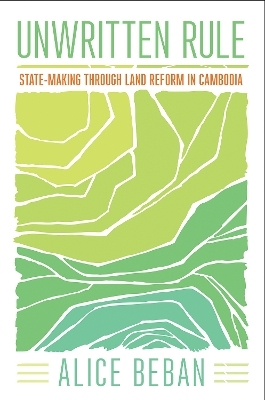
Unwritten Rule
State-Making through Land Reform in Cambodia
Seiten
2021
Cornell University Press (Verlag)
978-1-5017-5404-3 (ISBN)
Cornell University Press (Verlag)
978-1-5017-5404-3 (ISBN)
In 2012, Cambodia—an epicenter of violent land grabbing—announced a bold new initiative to develop land redistribution efforts inside agribusiness concessions. Alice Beban's Unwritten Rule focuses on this land reform to understand the larger nature of democracy in Cambodia.
Beban contends that the national land-titling program, the so-called leopard skin land reform, was first and foremost a political campaign orchestrated by the world's longest-serving prime minister, Hun Sen. The reform aimed to secure the loyalty of rural voters, produce "modern" farmers, and wrest control over land distribution from local officials. Through ambiguous legal directives and unwritten rules guiding the allocation of land, the government fostered uncertainty and fear within local communities. Unwritten Rule gives pause both to celebratory claims that land reform will enable land tenure security, and to critical claims that land reform will enmesh rural people more tightly in state bureaucracies and create a fiscally legible landscape. Instead, Beban argues that the extension of formal property rights strengthened the very patronage-based politics that Western development agencies hope to subvert.
Beban contends that the national land-titling program, the so-called leopard skin land reform, was first and foremost a political campaign orchestrated by the world's longest-serving prime minister, Hun Sen. The reform aimed to secure the loyalty of rural voters, produce "modern" farmers, and wrest control over land distribution from local officials. Through ambiguous legal directives and unwritten rules guiding the allocation of land, the government fostered uncertainty and fear within local communities. Unwritten Rule gives pause both to celebratory claims that land reform will enable land tenure security, and to critical claims that land reform will enmesh rural people more tightly in state bureaucracies and create a fiscally legible landscape. Instead, Beban argues that the extension of formal property rights strengthened the very patronage-based politics that Western development agencies hope to subvert.
Alice Beban is Senior Lecturer of Sociology at Massey University.
1. Introduction
2. Donor-State Partnerships in the Cambodian Land Sector
3. Encountering the Leopard Skin Land Reform
4. Reconfiguring Local Authority through Land Reform
5. Youth Volunteers to the Frontier
6. Life in the Leopard Skin
7. Communal Land Struggles in the Wake of the Land Reform
8. An Ontology of Land Beyond State-Capital Formations
9. Conclusion
| Erscheinungsdatum | 11.03.2021 |
|---|---|
| Reihe/Serie | Cornell Series on Land: New Perspectives on Territory, Development, and Environment |
| Zusatzinfo | 3 Graphs; 9 Halftones, black and white; 3 Maps |
| Verlagsort | Ithaca |
| Sprache | englisch |
| Maße | 152 x 229 mm |
| Gewicht | 454 g |
| Themenwelt | Geisteswissenschaften ► Geschichte ► Regional- / Ländergeschichte |
| Sozialwissenschaften ► Ethnologie | |
| Sozialwissenschaften ► Politik / Verwaltung | |
| Sozialwissenschaften ► Soziologie | |
| ISBN-10 | 1-5017-5404-1 / 1501754041 |
| ISBN-13 | 978-1-5017-5404-3 / 9781501754043 |
| Zustand | Neuware |
| Haben Sie eine Frage zum Produkt? |
Mehr entdecken
aus dem Bereich
aus dem Bereich


